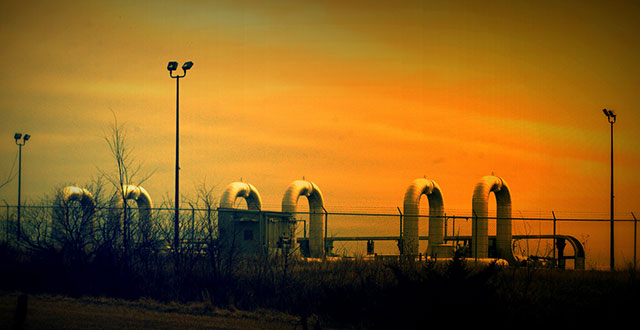
When President Donald Trump signed off on a presidential permit okaying the Keystone XL crude oil pipeline in March, it was a real blow to an environmental movement that had tasted victory over the dirty tar sands clunker back in 2015 when President Obama withdrew the permit for the project. With Trump and Canadian Prime Minister Justin Trudeau united in their support of the pipeline, it seemed little could stand in the way of some 830,000 barrels of dirty tar sands fuel barreling down a 36-inch crude oil pipe from Hardisty, Alberta through Montana, South Dakota, and Nebraska to export terminals in the Gulf of Mexico. The pipeline seemed destined to pass over, under, and through environmentally sensitive areas such as Nebraska’s Sandhills, and putt at risk the Ogallala Aquifer, one of the world’s largest underground freshwater sources.
But not so fast. Anti-pipeline activists are holding strong. And earlier this month, they announced Solar XL, the latest move in a battle waged against the pipeline. Launched July 7 by a coalition of groups including Bold Nebraska, 350.org, Indigenous Environment Network, and Oil Change International, the campaign features a series of solar panel arrays installed directly on the KXL pipeline route as it passes through Nebraska.
“We are putting solutions in the path of the problem,” said Sara Shor, a campaigner for 350.org. “TransCanada will have to literally dig up these solar arrays in order to build a polluting pipeline of the past that will pollute land and water, increase carbon emissions, and make climate change worse. The first project will be completed by the time the hearing in Lincoln starts in August.”
Each installation will cost $15,500 for a nine-panel frame, net-metering connection to the Nebraska power grid, and labor. The groups aim to raise $50,000 via crowdfunding at the Action Network to help finance the installation in locations where landowners have refused to sell to TransCanada.
The energy produced by the arrays will be used by Nebraska farmers and ranchers leading the fight against KXL in Nebraska, both symbolically and literally putting a renewable energy future directly in the path of some of the dirtiest fuel on the planet.
“I am vehemently opposed to the Keystone XL pipeline mainly because of the properties of the contents of the tar sands oil it will carry — this is not your Mother’s crude oil, it is the Devil’s, and it can kill,” said Nebraska landowner Jim Carlson. “We must be focused on clean, renewable energy and America can get along just fine without this foul concoction they call bitumen that TransCanada wants to pipe across our precious soil and water.”
The current pipeline route would also pass through Indigenous treaty lands, and the campaign includes solar panel installation at the Rosebud Sioux Tribe Spirit Camp in South Dakota, a prayer camp set up to oppose KXL back in 2014.
“On the Rosebud reservation in South Dakota, renewable energy projects are already serving Indigenous peoples, and more are being planned,” said Wayne Frederick, member of the Rosebud Sioux Tribe. “From Nebraska to Alberta, Indigenous peoples, farmers, and communities along Keystone XL’s route know that our best resistance is through putting the answers in the path of the problem.”
Advocates are honing in on Nebraska as it is the last state reviewing the pipeline — all the other states through which KXL would pass have already approved the project. The publically elected Public Service Commission (PSC) is tasked with approving (or not approving) the route. The PSC has been holding a series of hearings over the past months to gather information from the public, and is reviewing the thousands of comments registered in opposition to the project. The crucial final hearings are set to get underway August 3.
For grassroots activists such as Bold Nebraska, PSC is the last line of defense, and they are doing whatever they can to get the message out that Keystone XL has no place in the Cornhusker state. The group is made up largely of local farmers and ranchers fighting against the use of eminent domain to get the pipeline onto Nebraska land, as threatened by TransCanada, the Canadian energy company behind the project.
“Building America means relying on energy that protects our property rights and ensures we have clean drinking water. Foreign tar sands in the Keystone XL pipeline, that would flow to the export market, is not in our public or our state’s interest,” Bold Alliance president Jane Kleeb said in a statement. “When faced with challenges, Nebraskans find solutions together to show our communities’ values and the bond to the land that TransCanada cannot break or buy.”
Since President Trump approved KXL, it seems there has been no shortage of news demonstrating why it isn’t needed, from the withering away of customer interest in using the new pipeline to new statistics showing more people working in the solar industry than oil, gas and coal combined, which begs the question of who stands to benefit from more fossil fuel infrastructure.
“The fight is absolutley not over,” Shor said. “And no matter what happens in Nebraska, Trump’s complete disregard for communities in approving this project has only activated thousands more people to fight the fossil fuel projects that are in their backyards,” Shor said. “Every fossil fuel company should be shaking in their boots because of the inevitable transition away from fossil fuels to renewable energy projects.”
Join us in defending the truth before it’s too late
The future of independent journalism is uncertain, and the consequences of losing it are too grave to ignore. To ensure Truthout remains safe, strong, and free, we need to raise $46,000 in the next 7 days. Every dollar raised goes directly toward the costs of producing news you can trust.
Please give what you can — because by supporting us with a tax-deductible donation, you’re not just preserving a source of news, you’re helping to safeguard what’s left of our democracy.